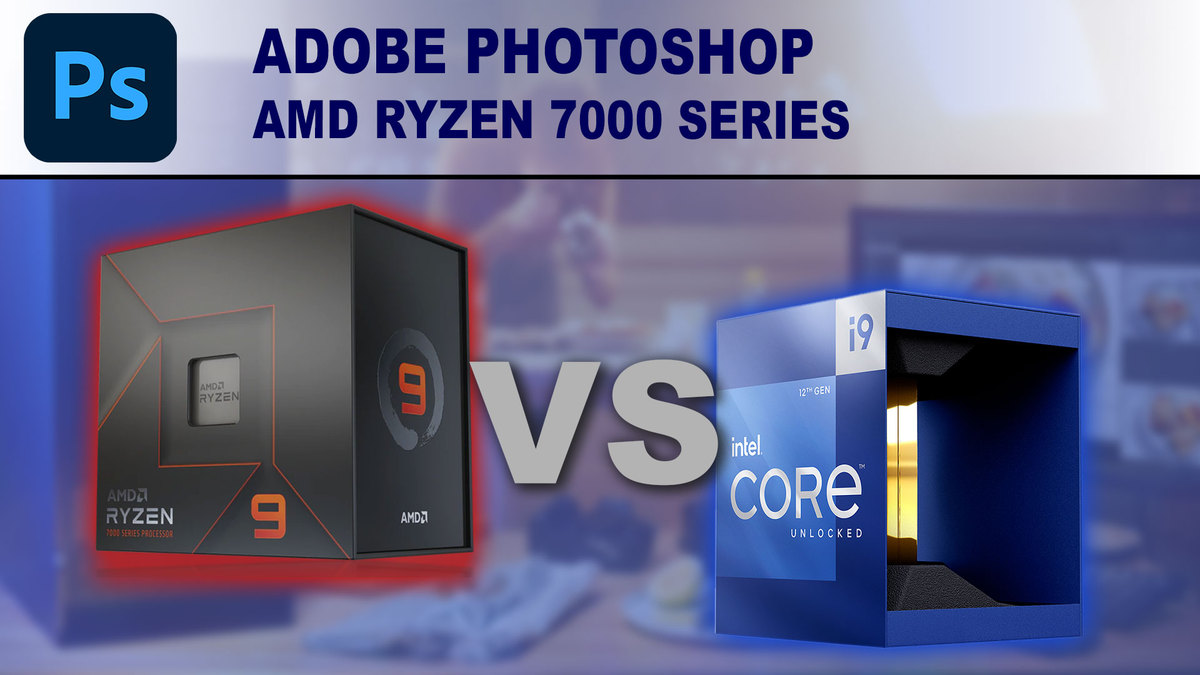Table of Contents
TL;DR: AMD Ryzen 7000 Series performance in Photoshop
The new AMD Ryzen 7000 Series processors do very well in Photoshop, showing a solid 22-30% performance gain versus the previous generation Ryzen 5000 Series. At the top end, this makes the Ryzen 9 7950X and 7900X roughly on par with the Intel Core i9 12900KS and 12900K, making either Intel or AMD a valid option.
Lower down the stack, the AMD Ryzen 7 7700X and Ryzen 5 7600X manage to take roughly an 8% lead over the Intel Core i7 12700K and i5 12600K respectively. This currently makes AMD the stronger choice from a performance standpoint if you are on a tighter budget.
Introduction
Earlier this month, AMD announced their new Ryzen 7000 Series desktop processors along with the LGA socket AM5 platform. These processors are marketed as having substantially better performance for content creation applications in part due to their "Zen 4" architecture, as well as support for new technologies like DDR5 memory.
In Photoshop, we expect these new CPUs to do very well since AMD has advertised up to a 13% IPC (Instructions Per Clock) performance improvement over the previous generation, which should help considerably in lightly threaded applications like Photoshop. Intel has traditionally held a lead over AMD in Photoshop, so it will be interesting to see if Ryzen 7000 is able to match, or beat, the Intel Core 12th Gen processors.
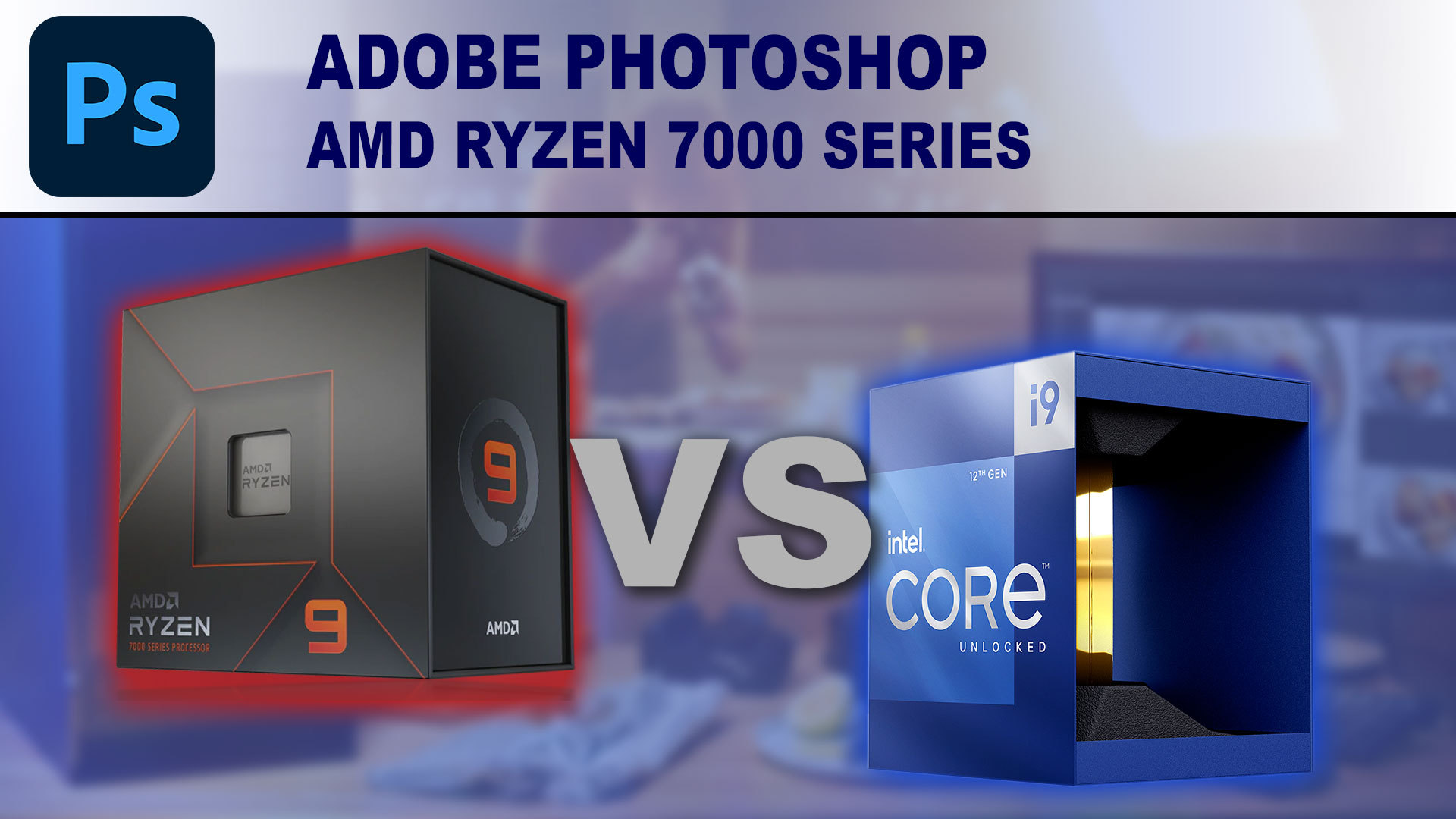
In this article, we will be using our PugetBench for Photoshop 0.93.3 benchmark paired with Photoshop 23.5 to examine the performance of the new AMD Ryzen 7000 Series CPUs. As a comparison, we will be including the previous generation AMD Ryzen 5000 Series, as well as their primary competition – the Intel Core 12th Gen processors. While we are including most of the primary models from each of these product lines, note that we are skipping the AMD Ryzen 7 5800X3D which features AMD's 3D V-Cache Technology. We have looked at this model in past articles, and found that for content creation, it is either on par or slower than the normal Ryzen 7 5800X model.
If you want to read more about the new AMD Ryzen 7000 Series and what sets them apart from the previous generation, we recommend checking out our main AMD Ryzen 7000 Series Processors Content Creation Review article. That post includes more detailed information on the CPU specifications, testing results for a range of other applications including Lightroom Classic, Premiere Pro, After Effects, and Unreal Engine; as well as all the test setup details for both the hardware and software used in our testing.
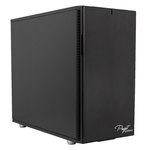
Puget Systems offers a range of powerful and reliable systems that are tailor-made for your unique workflow.
Raw Benchmark Data
While our benchmark presents various scores based on the performance of each test, we also like to provide individual results for you to examine. If there is a specific task that is a hindrance to your workflow, examining the raw results for that task is going to be much more applicable than the scores that our benchmark calculated.
Feel free to skip to the next sections for our analysis of these results to get a wider view of how each configuration performs.

AMD Ryzen 7000 vs Intel Core 12th Gen for Photoshop
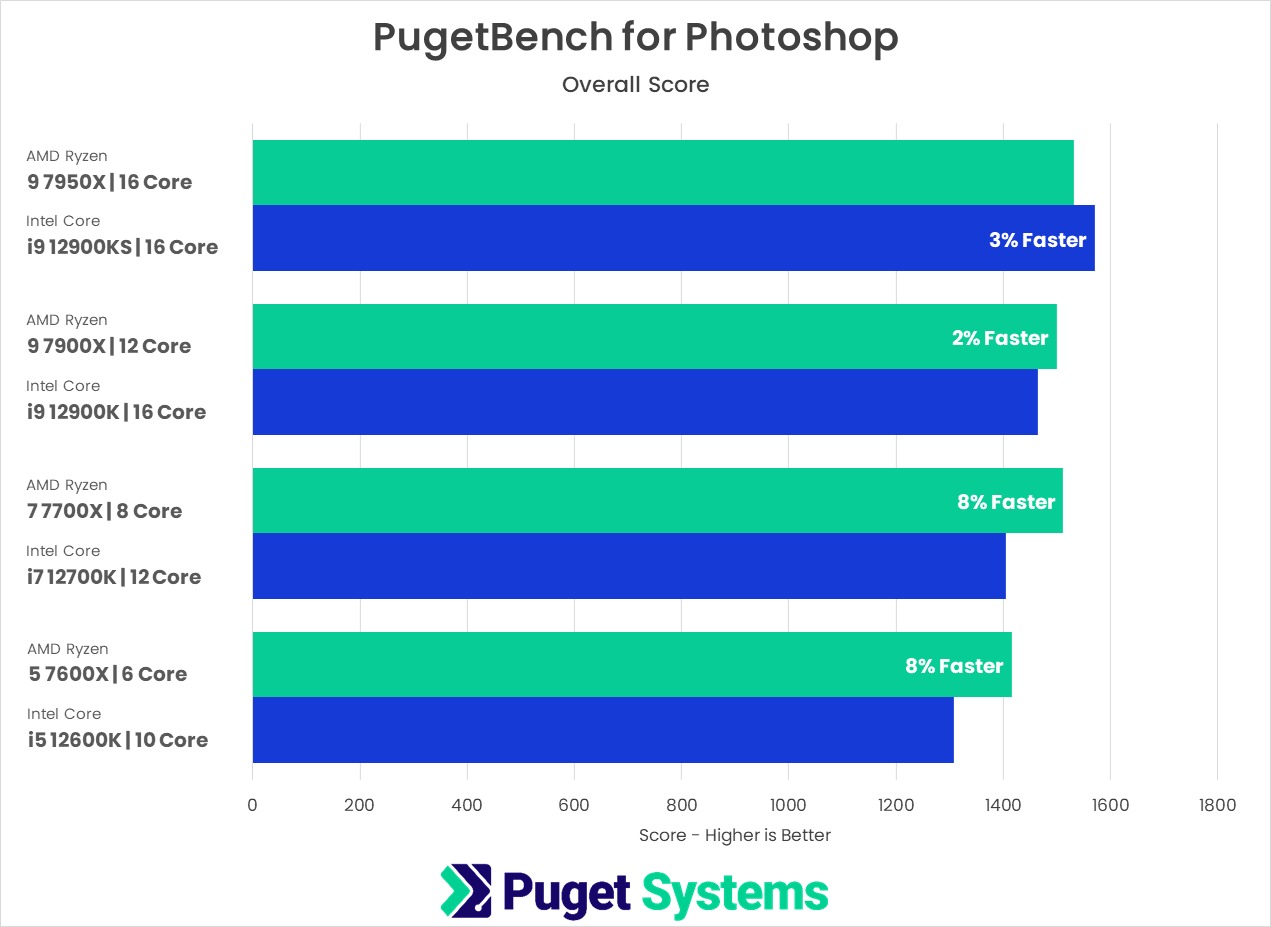
To start off our analysis, we wanted to look at how the new Ryzen 7000 series compares to the Intel Core 12th Gen processors. The MSRP pricing for Intel and AMD don't exactly match, but in most cases, the comparisons we are making in the chart above are looking at CPUs that have an MSRP within $40 of each other. We have a full breakdown of the MSRP of each of these CPUs in our main AMD Ryzen 7000 Series Processors Content Creation Review article if you want to get into the specifics.
At the top end, both the AMD Ryzen 9 7950X and Ryzen 9 7900X perform within a few percent of the Intel Core i9 12900KS and 12900K respectively. This is well within the margin of error for this kind of real-world testing, and means that you are unlikely to notice a difference between Intel and AMD during normal Photoshop use.
With the Ryzen 7 7700X and Ryzen 5 7600X, however, AMD pulls ahead of Intel by about 8%. This isn't a massive difference in performance, but it is large enough that you may notice a slight difference for longer tasks.
Something interesting that may not be readily apparent is that the Ryzen 7 7700X, Ryzen 9 7900X, and Ryzen 9 7950X all performed within a few percent of each other, scoring between 1500 and 1532 points. In other words, if Photoshop is your primary concern and you opt to go with AMD, you might as well save your money and get a Ryzen 7 7700X and spend the savings on more RAM, faster storage, etc.
AMD Ryzen 7000 vs AMD Ryzen 5000 for Photoshop
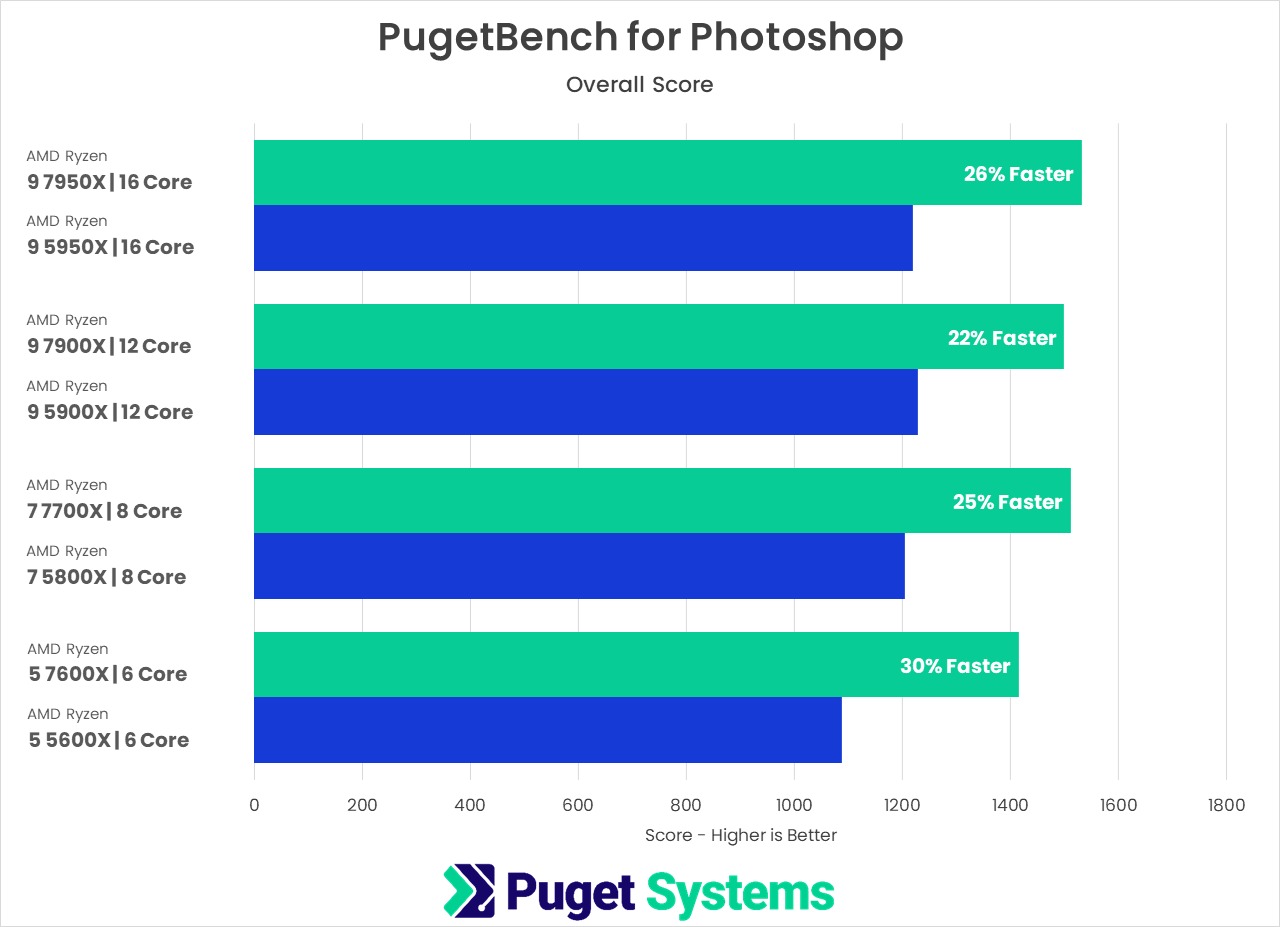
In the previous section, we saw that the new AMD Ryzen 7000 Series processors are either on par or slightly faster than the Intel Core 12th Gen models, but what it doesn't show is just how much of an improvement that is for AMD over the previous generation.
Historically, Intel has held a strong lead in lightly threaded applications like Photoshop, which often removed AMD from consideration for this type of workflow. But, as you can see in the chart above, AMD made huge strides with the 7000 Series, showing between 22% and 30% higher performance than the previous generation Ryzen 5000 Series.
That is a massive performance gain over a single generation, and the main reason why AMD was able to bring their Ryzen series to be roughly on par – or ahead – of Intel's Core line.
How well do the AMD Ryzen 7000 Series CPUs perform in Photoshop?
The new AMD Ryzen 7000 Series processors do very well in Photoshop, showing a solid 22-30% performance gain versus the previous generation Ryzen 5000 Series. At the top end, this makes the Ryzen 9 7950X and 7900X roughly on par with the Intel Core i9 12900KS and 12900K, making either Intel or AMD a valid option.
Lower down the stack, the AMD Ryzen 7 7700X and Ryzen 5 7600X manage to take roughly an 8% lead over the Intel Core i7 12700K and i5 12600K respectively. This currently makes AMD the stronger choice from a performance standpoint if you are on a tighter budget.
However, it is worth pointing out that Intel is expected to launch their new Core 13th Gen processors sometime later this year, with some sites like Tom's Hardware speculating that they could launch as early as October. We won't know how those upcoming Intel processors will perform until they are released, but given the short timeframe we are likely dealing with, it may be worth holding off on purchasing a Ryzen 7000 (or an Intel Core 12th Gen) processor for a little bit if you can. Considering how small of a lead AMD has for Photoshop with the Ryzen 7000 Series, it may well end up that Intel will be able to make a strong comeback with their upcoming 13th Gen processors.
Update 9/27/2022: Intel has officially announced that the 13th Gen CPUs will be available in October.
Keep in mind that the benchmark results in this article are strictly for Photoshop and that performance will vary widely in different applications. If your workflow includes other software packages, we highly recommend checking out our AMD Ryzen 7000 Series Processors Content Creation Review article which includes results and links to in-depth testing for a range of other applications including Premiere Pro, After Effects, Lightroom Classic, DaVinci Resolve, and Unreal Engine.

Puget Systems offers a range of powerful and reliable systems that are tailor-made for your unique workflow.
